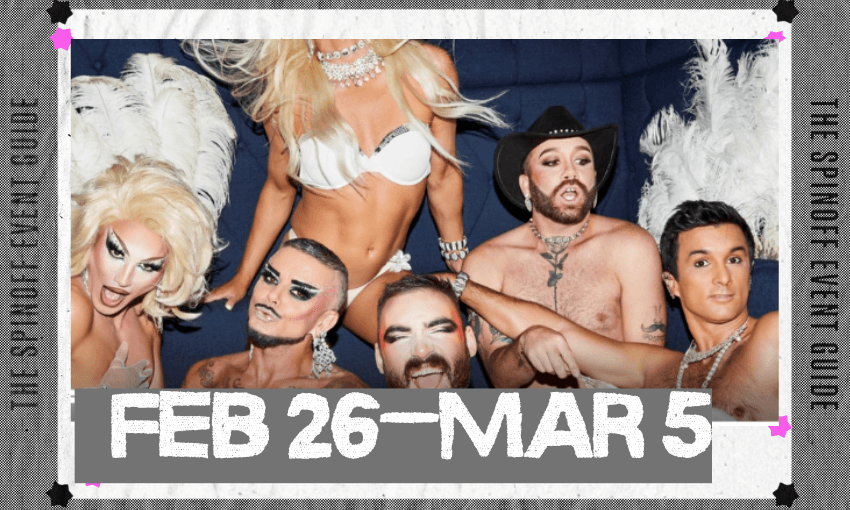David Farrier’s latest documentary sees him follow an odd car clamping saga to a much, much stranger destination. It’s a gripping and troubling watch, says Tim Batt.
This review was originally published on Flicks.
There are a lot of reasons to worry about David Farrier.
He seems to have a sixth sense for pursuing banal subjects of investigation that eventually lead to the darkest side of humanity. At this point, you have to wonder if this talent isn’t something connected to his own psyche – that something inside the journalist/filmmaker is self-generating a gravitational pull that invites villains and sociopaths to enter his orbit. Even when he thinks he’s just writing a Spinoff piece about frustrated Ponsonby car owners, it eventually devolves into a six-year journey about which he told Flicks: “I fucking hated the whole experience”.
As you may know, the genesis of Mister Organ was an inquiry into what the heck was going on at an Auckland antique store that became infamous for clamping cars in their car park. Where the story goes from there really must be seen to be believed.
Over the course of 90 minutes, a deeply unsettling tale is unspooled about the sort of character in life that I personally take great care to avoid. Farrier runs towards these burning human dumpsters at the same speed any sane person would flee from them, and luckily for the audience he brings cameras and a journalistic fervour. There’s a terrifying moment where the film’s subject, Mr Organ himself, says to David: “You knew right from the start what you were doing. You didn’t know all the facts, but you knew what you were doing.” There’s something to that.
Another reason to worry about David Farrier is his propensity to entangle himself with truly deranged and dangerous people. Tickled had David D’Amato; this project has Michael Organ. Or Micheal Organ. Or Michael Organe. Or Michael Organ O’Sullivan. Or perhaps even Count Michael Andrassy-Organe. The transmutability of his name turns out to play a far larger role than the initial impression of a petty crook that the film offers up.
The hurricane of emotional damage seen here in the people who’ve been left in Mr Organ’s wake is chilling. Farrier himself spends countless hours trying to get some sort of a grip on the guy, to extremely limited success. There are one-sided phone calls between the filmmaker and protagonist that last for three hours. Bizarrely, there are coffee dates between the two that leave Farrier in a fugue-like state. Farrier has featured a generous amount of himself in the movie, as a way to try and display how Organ operates, because explaining it is utterly futile. Like trying to describe how a dull but never ending headache feels to someone who’s never experienced one.
There are many lenses to view Mister Organ through. Psychologists (both amateur and qualified) will have a field day observing the film’s subject, while recalling different parts of the DSM-5. Reality TV enthusiasts who live for drama will be entranced by the twists and turns this story produces. Personally, I have a passing interest in the occult and recognise aspects of Aleister Crowley-style Magick in Mr Organ. There is a quality of shaping reality to his will that is reminiscent of the would-be alchemists and cult figures of a bygone era. Perhaps I’m just being influenced too much by his goatee. It seems equally likely that he’s fashioned it precisely for the purpose of subtly evoking the devil.
The film itself is a gripping watch. I commend all involved in achieving a disciplined 90-minute run time out of an investigation that has taken six years to complete. I can’t imagine the information and scenes that wound up on the cutting room floor. Despite its brisk duration, however, it’s no mean feat to hold an audience’s attention for even this amount of time with sparsely soundtracked talking heads—which makes up the majority of this film. But once again, Farrier has somehow attracted – or been attracted to (it’s hard to tell) – another unbelievable real life character that is fascinating and mesmerising in the worst ways possible.
I worry about David Farrier. I worry for whatever it is inside him that gives him the ability to both find and somehow tolerate existing alongside these people long enough to uncover the incredible stories he brings to light in his films. I also worry about the very real danger he appears to put himself in to pursue these stories. I recommend anyone who has the bandwidth to watch something pretty mindfucky head along and see it at the cinema as soon as possible.



